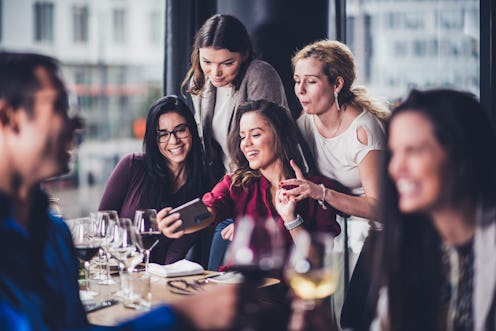Self
Experts Share Their Best Tips For Making Socializing Feel Normal Again
Ease back into IRL convos.

After over a year indoors, restricted to seeing loved ones over a Zoom screen, you’re vaccinated, ready to dive back into life — and you’ve completely forgotten how to interact with others. Where do you stand? What do you do with your hands? Is ‘so, how was the pandemic for you’ an acceptable conversation starter?! Many people have found that they’ve lost their social skills over lockdown, experts tell Bustle, but there are a few tricks to get yourself back into the flow of social interaction post-COVID.
“Social skills are like a muscle — they can atrophy without use,” psychiatrist Dr. Mimi Winsberg M.D., chief medical officer for mental health platform Brightside, tells Bustle. “But they can be rebuilt.” Below, you’ll find tips for getting back out there post-pandemic.
Ease Back Into Socializing & Make Some Changes
Take it slow to begin with. “Too much too soon may feel overwhelming and exhausting,” Dr. Winsberg says. “Start resuming social life with your inner circle and gradually expanding outward to resume life as you previously knew it.” If the thought of going back into the world, to a cocktail party or a work function, is giving you serious anxiety, don’t push that away. “Pay attention to your distress level,” therapist Heidi McBain LMFT LPC tells Bustle. “When do you feel more comfortable? When do you feel less comfortable?” This may take some trial and error, but you may find that some things really make you stressed, while others — a chilled-out movie night with friends — aren’t that big of a deal.
This is also an opportunity to create changes in your social landscape, Dr. Winsberg says. “How much time do you want to spend in an open office environment? How often do you want to eat out? How many close friends do you find that you need, having spent the last year with fewer of them?”
Bond Over The Discomfort
The fact that this has been a global experience is an advantage; everybody else is in the same boat. “It’s isn't going to be by trying to show everybody that you’re perfectly OK and everything is wonderful that you’ll be able to create meaningful relationships,” behavioral scientist Jon Levy, author of You’re Invited: The Art & Science Of Cultivating Influence, tells Bustle. Leaning into the opposite idea can be helpful at post-pandemic parties. Be open about how difficult social interaction is and how confusing you’re finding things, Levy says. There’s a “vulnerability loop” which means that when people are vulnerable to one another they build trust, he says. If you say ‘God, I cannot figure out small talk these days, right?’, chances are your conversation partner will say, ‘Oh, me too!’ and you’ll build a moment of connection, even if you didn’t know or trust one another before.
Levy says you should also be watching for other peoples’ discomfort in social situations, and bonding with them. “We can increase trust and feelings of belonging both through putting out those signals, and being highly attuned to other people's signals,” he says. Take risks and give that head-nod in the hallway to that person who used to nod back. “The worst thing that'll happen is they might not recognize you and you might feel a little silly,” he says. But they could also see the gesture and take comfort from it.
Embrace New Socializing Rules & Rituals
Dr. Winsberg says you should try not to worry about social protocols in the new post-vaccinated world — how much eye contact you use, whether you can consult your phone in an in-person conversation the way you did on Zoom calls, and so on. “These new rules are yet to be established post-pandemic,” she says.
McBain suggests charging yourself up before you go into social situations. “Focus on activities that can help you feel more centered and grounded, such as meditation, mindfulness, exercise, and so on,” she says. Create a little pre-social ritual that helps give you energy. Once you’ve rebuilt a little bit of confidence and got back into the swing of things, reach out to others. “Those of us who are more social really have an obligation to invite and include the people who are in the most vulnerable situations right now,” Levy says. “And those of us who are the most introverted should really be accepting those invitations, even if we want to just be alone.” Say yes to stuff that you think pre-pandemic you would have enjoyed, and be prepared for it to be different — good, but different.
Levy says that what really matters at the moment isn’t actually how much you stumble through a conversation. “Right now everybody's worried about their social competence, but that's not what we really care about,” he says. “We care about people's benevolence, that they care about us.” Being interested — in your cousin’s flourishing quarantine orchids, your coworker’s struggle with her pandemic housemates, your best friend’s attempts to write the next Bridgerton — is much more valuable than being a sparkling wit.
If re-adapting to social life is a real struggle, McBain suggests seeing a therapist to chat through it all. “You can discuss your anxiety in a safe place, and also grieve the losses in your own life from this past year.”
Experts:
Behavioral scientist Jon Levy, author of You’re Invited: The Art & Science Of Cultivating Influence
Therapist Heidi McBain LMFT LPC
Psychiatrist Dr. Mimi Winsberg M.D. chief medical officer for mental health platform Brightside